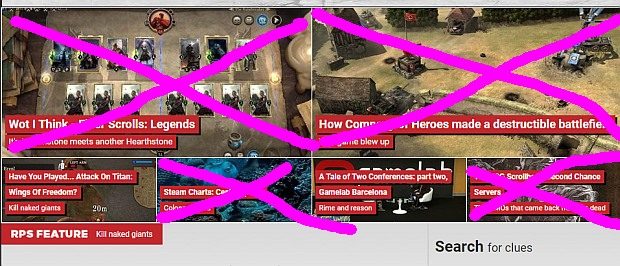RPS Suggests: Game stores and sites that say no
It's time to specialise more
RPS Suggests is where we put forward our own ideas for new games, or changes to old games, or anything else. Think of it like backseat driving for the games industry.
Here are two things that a healthy videogames ecosystem requires: digital distribution platforms that are accessible to any developer who wants to release a game, and websites which attempt to cover every game released.
We have both of the above now and that's great. Do you know what else is good for a healthy videogames ecosystem? The exact opposite of those things.
It is wonderful that we now live in a world where there are dozens and dozens of PC games released each day, but as more and more are added to Steam, it becomes a less useful service for discovering games. That's a shame, but it's not the platform's primary goal, and I don't think recommendation algorithms, Steam Curators or any other change will ever reverse the trend.
I do think that other digital stores which are more exclusive and curated at a fundamental level is a good idea, though. Stores designed only to sell adventure games, or non-violent games, or games about flowers, or games about crafting, or games that begin with the letter 'b', and which look at every other game and go: nah. Stores where you know what you're getting when you walk in the door, because you understand that the store has a certain set of aesthetic values that it uses to select its stock.
There is one obvious instance of this already in existence, Good Old Games. With some exceptions, you know that the games on the site are going to be old and going to be, broadly speaking, good. That's useful as a shopper, but it has also led to the site doing a tremendous amount of work to bring good, old games back from the dead by making them playable on new computers. That's a great example of where specificity can help a community and a culture to grow in a way a general game store likely wouldn't.
It is essential, also, that we have websites like IGN, Gamespot and so on which aim to cover every game as fully as possible. Set aside whatever you think about the quality of their output (and I think both do plenty of good work), if sites doing what they do didn't exist, you'd need to create them. Obviously there are a bunch of finite resources - time and money, mainly - that stop them from covering everything, but the point is that they're big tents that don't specifically exclude any particular type of game.
Yet I wish also that we had more sites with an explicit set of aesthetic values which the editors used to decide what games to cover and what games to ignore. No, only covering PC games and not console games doesn't count.
In both instances - digital stores and journalistic websites - exclusivity would help games and genres find an audience and to grow in more interesting ways.
The clearest example of this in criticism lies with music, in which the most popular magazines and sites have traditionally had a clearly defined sense of taste. In the UK, it's pretty obvious what kind of music the NME will cover, for example, and how that differs from what Q magazine will put on the front.
This would lead, I think, to better writing and better games. Take reviews: they're often charged with providing buyer's advice for a general audience that includes potentially anyone. It's hard to make meaningful recommendations when you're not sure who your audience is, leading to desperate cop-outs like, "If you like this sort of thing, you'll like this sort of thing."
Or consider review scores specifically. It's been a complaint for decades that game reviews tend to huddle around scores from 7 to 10, and it's at least in part because "Good" or "Quality" are such vague terms that the reviews become over-concerned with basic things like, "is it polished" or "does it have bugs" or "how technologically advanced are its graphics". Having a distinct set of aesthetic values lets you judge games against those values and rate them accordingly. So PurpleGames.com could dedicate itself to games with lots of the colour purple in, and gives games without much purple 1/10 every time.
A good critic dedicated to a single subject can also do a lot of work there's less space for at generalist sites, by picking out trends, drawing connections between games past and present, and talking in more detail for an audience that's informed enough to follow along with the really nerdy stuff. Criticism like this tends to create an audience for the kind of work it's covering, too, and thus helps more (and more interesting) games to succeed.
There is a feedback loop that happens between creative communities and the critics that cover them, but it happens at its best when it's focused. When it is instead generalised - and worse, averaged out further via aggregators like Metacritic - then the feedback loop will only lead to more formulaic games. Such as when every game decided it needed to have a multiplayer mode, because games with multiplayer modes got a few extra points in reviews, because reviewers were writing reviews for everyone and out of everyone, some people like multiplayer.
I think these changes - to stores and to games websites - would help people find more games to play that they actually like, without the burden of trying to teach robots their opinions.
Unfortunately, there's a catch: the market for games and games criticism probably doesn't support any of these ideas. But let's call that someone else's problem.


